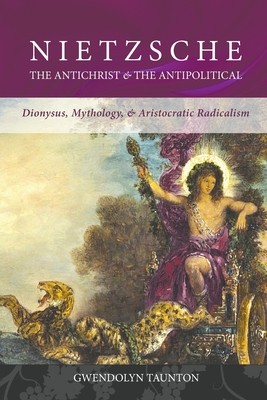
- We will send in 10–14 business days.
- Author: Gwendolyn Taunton
- Publisher: Manticore Press
- Year: 2020
- Pages: 160
- ISBN-10: 0648766063
- ISBN-13: 9780648766063
- Format: 15.2 x 22.9 x 0.9 cm, minkšti viršeliai
- Language: English
- SAVE -10% with code: EXTRA
Reviews
Description
Friedrich Nietzsche has had an enormous influence on the arts, politics, and even the occult realm. Moreover, this influence has not waned in the contemporary era. Despite this, Nietzsche remains widely misunderstood, primarily when he discusses religion and politics. Nietzsche: The Antichrist & the Antipolitical highlights the finer points of Nietzsche's opinions on religion, culture, and politics from an unbiased and neutral perspective.
The first section of the book explores the specific significance of Dionysus in both Greek mythology and the works of earlier German authors. For Nietzsche, Dionysus is not just a pagan god, but a symbol of the Will, a primordial power that is eternally reborn, which Nietzsche identifies with the Antichrist. Nietzsche: The Antichrist & the Antipolitical then explains how Nietzsche's portrayal of Dionysus is integral to understanding his opinions on religion and how it has altered Western culture.
The second half of the book concentrates on how Nietzsche's views on religion and mythology extend into political issues, and ultimately, his antipolitical philosophy. Walter Kaufmann once described Nietzsche as an "antipolitical individual who seeks self-perfection far from the modern world." However, Nietzsche's antipolitical individualism entails much more than merely abstaining from politics and being an individualist. Nietzsche's antipolitical stance is part of his broader cultural agenda, which Georg Brandes referred to as aristocratic radicalism.
EXTRA 10 % discount with code: EXTRA
The promotion ends in 22d.20:17:24
The discount code is valid when purchasing from 10 €. Discounts do not stack.
- Author: Gwendolyn Taunton
- Publisher: Manticore Press
- Year: 2020
- Pages: 160
- ISBN-10: 0648766063
- ISBN-13: 9780648766063
- Format: 15.2 x 22.9 x 0.9 cm, minkšti viršeliai
- Language: English English
Friedrich Nietzsche has had an enormous influence on the arts, politics, and even the occult realm. Moreover, this influence has not waned in the contemporary era. Despite this, Nietzsche remains widely misunderstood, primarily when he discusses religion and politics. Nietzsche: The Antichrist & the Antipolitical highlights the finer points of Nietzsche's opinions on religion, culture, and politics from an unbiased and neutral perspective.
The first section of the book explores the specific significance of Dionysus in both Greek mythology and the works of earlier German authors. For Nietzsche, Dionysus is not just a pagan god, but a symbol of the Will, a primordial power that is eternally reborn, which Nietzsche identifies with the Antichrist. Nietzsche: The Antichrist & the Antipolitical then explains how Nietzsche's portrayal of Dionysus is integral to understanding his opinions on religion and how it has altered Western culture.
The second half of the book concentrates on how Nietzsche's views on religion and mythology extend into political issues, and ultimately, his antipolitical philosophy. Walter Kaufmann once described Nietzsche as an "antipolitical individual who seeks self-perfection far from the modern world." However, Nietzsche's antipolitical individualism entails much more than merely abstaining from politics and being an individualist. Nietzsche's antipolitical stance is part of his broader cultural agenda, which Georg Brandes referred to as aristocratic radicalism.


Reviews